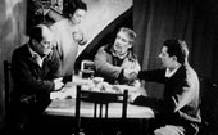|
|
||||
|
|
by Donald Levit  In the Told with a fairy misting partly via child Ángel’s (Blai Pascual) voice-over and bringing in Europe’s fox-and-grandmother folk tale, the film is a quick-switching mosaic of characters’ interacting lives against inhospitable foggy mountains, the constantly moving waters of streams and ponds, and Dionysus’ Eleusinian cycles of the growth, death and rebirth of nature as well as man. Fatherless Ángel and older sister Dolors (Diana Palazón) take care of silent dying Grandmother (Vicenta Alemany) in a village isolated even further by a postman who peels off stamps to then discard the envelopes. Dolors’ longing notes never reach their mother, Teresa (Rosana Pastor), off working with a traveling circus and, in the daughter’s waking dreams, being loved by handsome men. The nearest big place, the future, is In suitably muted colors, these small lives intertwine and separate in the immemorial dance. Brother and sister learn life-lessons, and an expected death, plus an impending one, will round things out. Not under the cherry tree, but an umbrella in the incessant rain amidst good-byes, new love will take root. The title remains a puzzle, for though Grandma says it is merely asleep despite winter appearances and will make fruit come springtime, the solitary cherry tree is not as she maintains, and a chainsaw sounds an end to its twisted rock-faced agony. Ángel delights in crayoning cherry trees, surrounded by woodland animals, and imagines the Plutarchan “better place” filled with them, but the symbolic import is never clear. Twenty-seven at the time, Recha fell into the mistake of young filmmakers, that of beginner’s insecurity that results in unsubtle overkill. The land, an obvious participant, is panned too often, and the gurgling water of the lifecycle of earth and its creatures is maddeningly recurrent. The leafs of a wall calendar for these three months, 1994-95, should have been seen once or twice, no more, and birds and village dogs might have chirped, cawed or barked less. But the film is gently celebratory, of a kind that our own domestic output seldom manages. This is not easy nostalgia or the ‘80s “con Franco vivimos mejor” -- “we lived better under Franco” -- rumbled in (Released by Atocha Films; not rated by MPAA.) |
||
|
© 2026 - ReelTalk Movie Reviews Website designed by Dot Pitch Studios, LLC |



